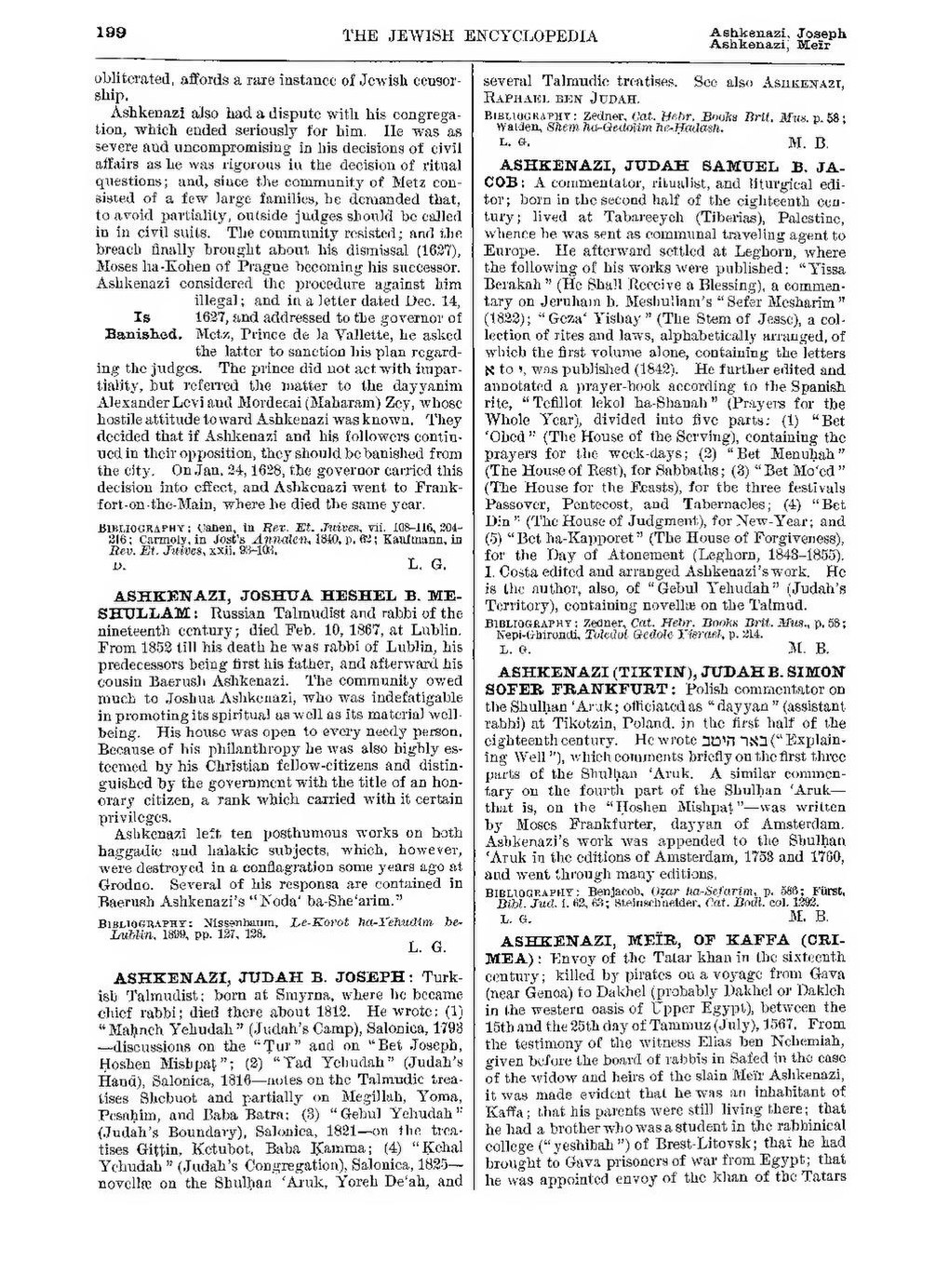199
THE JEWISH ENCYCLOPEDIA
obliterated, affords a rare instance of ship.
Jewish censor-
Ashkenazi, Joseph Ashkenazi, Meir
Talmudic
several
See also Ashkenazi,
treatises.
Raphael ben Judah.
Ashkenazi also had a dispute with his congregawhich ended seriously for him. He was as severe and uncompromising in his decisions of civil affairs as he was rigorous in the decision of ritual questions; and, since the community of Metz consisted of a few large families, he demanded that,
Bibliography
to avoid partiality, outside judges should be called in in civil suits. The community resisted; and the
tury;
breach finally brought about his dismissal (1627),
Europe.
Moses ha-Kohen of Prague becoming his successor. Ashkenazi considered the procedure against him illegal and in a letter dated Dec. 14, Is 1627, and addressed to the governor of Banished. Metz, Prince de la Vallette, he asked
the following of his works were published: "Yissa Berakah " (He Shall Receive a Blessing), a commentary on Jeruham b. Meshullam's " Sefer Mesharim "
the latter to sanction his plan regardThe prince did not act with impartiality, but referred the matter to the dayyanim Alexander Levi and Mordecai (Maharam) Zey, whose hostile attitude toward Ashkenazi was known. They decided that if Ashkenazi and his followers continued in their opposition, they should be banished from On Jan. 24, 1628, the governor carried this the city. decision into effect, and Ashkenazi went to Frank fort-on-the-Main, where he died the same year.
the letters edited and annotated a prayer-book according to the Spanish rite, "Tefillot lekol ha-Shanah " (Prayers for the Whole Year), divided into five parts: (1) "Bet 'Obed" (The House of the Serving), containing the prayers for the week-days (2) " Bet Menuhah (The House of Rest), for Sabbaths (3) " Bet Mo'ed " (The House for the Feasts), for the three festivals
ing the judges.
Bibliography
Cahen, in Rev. Et. Juives,
216; Carmoly, in Jost's
Rev. Et. Juives. D.
Annalen,
108-116, 2041840, p. 62; Kaufmann, in vii.
xxii. 93-103.
L. G.
ASHKENAZI, JOSHUA HESHEL,
B. MERussian Talmudist and rabbi of the nineteenth century; died Feb. 10, 1867, at Lublin. From 1852 till his death he was rabbi of Lublin, his predecessors being first his father, and afterward his cousin Baerush Ashkenazi. The community owed much to Joshua Ashkenazi, who was indefatigable in promoting its spiritual as well as its material wellbeing. His house was open to every needy person. Because of his philanthropy he was also highly esteemed by his Christian fellow-citizens and distinguished by the government with the title of an honorary citizen, a rank which carried with it certain
S HULL AM
Ashkenazi left ten posthumous works on both haggadic and halakic subjects, which, however, were destroyed in a conflagration some years ago at Grodno. Several of his responsa are contained in Baerush Ashkenazi's "Noda' ba-She'arim." Lublin,
Zedner, Cat. Hebr. Books Brit.
Mus.
p. 58
M. B.
L- G-
ASHKENAZI, JUDAH SAMUEL B. JACOB A commentator, ritualist, and liturgical edi:
born
tor;
in the
lived
second half of the eighteenth cen-
Tabareeyeh
at
whence he was
He
sent as
(Tiberias),
communal
Palestine,
traveling agent to
afterward settled at Leghorn, where
(1822); "Geza' Yishay " (The Stem of Jesse), a collection of rites and laws, alphabetically arranged, of
which the
N
to
first volume alone, containing was published (1842). He further
i,
Pentecost, and Tabernacles; (4) "Bet Din " (The House of Judgment), for New-Year and (5) "Bet ha-Kapporet" (The House of Forgiveness), for the Day of Atonement (Leghorn, 1843-1855). I. Costa edited and arranged Ashkenazi's work. He is the author, also, of " Gebul Yehudah " (Judah's Territory), containing novellas on the Talmud.
Passover,
privileges.
Bibliography:
Shem ha-Oedolim he-Hadash.
Walden,
tion,
Nissenbaum,
Le-Korot ha-Yefiudim he-
1899, pp. 127, 128.
L. G.
Zedner, Cat. Hebr. Books Brit. Mus., p. 58 Nepi-Ghirondi, Toledot Oedole Yisrael, p. 214.
Bibliography
M. B.
l. a.
ASHKENAZI (TIKTIN), JUDAH B. SIMON SOFER FRANKFURT Polish commentator on
the Shulhan 'Aruk; officiated as "dayyan " (assistant rabbi) at Tikotzin, Poland, in the first half of the eighteenth century. He wrote 3L3TI "1X3 (" Explaining Well"), which comments briefly on the first three similar commenparts of the Shulhan 'Aruk. tary on the fourth part of the Shulhan 'Aruk was written that is, on the " Hoshen Mishpat "
A
—
by Moses Frankfurter, dayyan of Amsterdam. Ashkenazi's work was appended to the Shulhan 'Aruk in the editions of Amsterdam, 1753 and 1760, and went through manj- editions. Bibliography: Benjacob, Ozar fta^Sefarim, Bibl. Jud.
i.
63, 63
Steinseh'neider,
p. 586; Fttrst, col. 1292.
Cat Bodl. .
M. B.
L. G.
ASHKENAZI, MEIR, OF KAFFA (CRIMEA) Envoy of the Tatar khan in the sixteenth
ASHKENAZI, JUDAH
JOSEPH:
Turkish Talmudist; born at Smyrna, where he became He wrote (1) chief rabbi died there about 1812. "Mahneh Yehudah" (Judah's Camp), Salonica, 1793 —discussions on the "Tur" and on "Bet Joseph, Hoshen Mishpat"; (2)'"Yad Yehudah" (Judah's Hand), Salonica, 1816— notes on the Talmudic treatises Shebuot and partially on Megillah, Yoma, Pesahim, and Baba Batra; (3) "Gebul Yehudah" (Judah's Boundary), Salonica, 1821 on the treatises Gittin, Ketubot, Baba Kamma; (4) "Kehal B.
—
Congregation), Salonica, 1825— novelise on the Shulhan Aruk, Yoreh De'ah, and
Yehudah" (Judah's
century killed by pirates on a voyage from Gava (near Genoa) to Dakhel (probably Dakhel or Dakleh in the western oasis of Upper Egypt), between the 15th and the 25th day of Tanimuz (July), 1567. From the testimony of the witness Elias ben Nehemiah, given before the board of rabbis in Safed in the case of the widow and heirs of the slain Me'ir Ashkenazi, it was made evident that he was an inhabitant of
Kaffa that his parents were still living there that he had a brother who was a student in the rabbinical college (" yeshibah ") of Brest-Litovsk that he had brought to Gava prisoners of war from Egypt that he was appointed envoy of the khan of the Tatars
